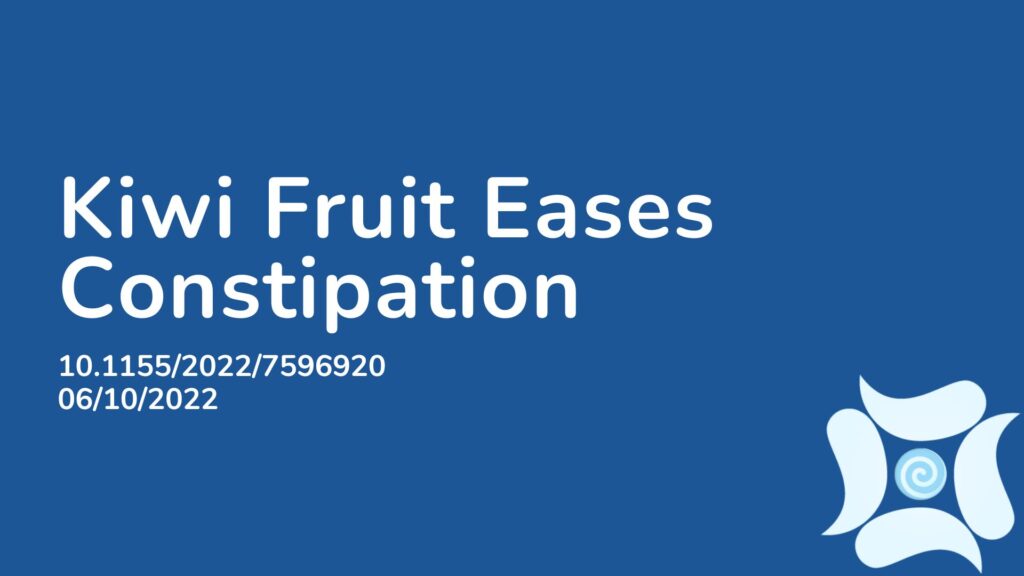Summary:
Chronic constipation, affecting 14% of the global population, poses significant challenges to quality of life. Traditional treatments involve laxatives, fiber supplements, and probiotics, but a growing number of patients seek natural alternatives, particularly dietary interventions. Kiwifruit has gained international recognition for its efficacy in managing chronic constipation, supported by numerous randomized controlled trials. The fruit’s laxative effects are linked to its high fiber and water content, along with the enzyme actinidin. Kiwifruit may improve gastrointestinal motility through enhanced gastric emptying and protein digestion, influencing gut microflora. Companies now offer chewable capsules with freeze-dried kiwifruit, containing actinidin, plant polyphenols, and dietary fiber. This systematic review assesses whether kiwifruit or its extracts enhance outcomes for those with chronic constipation, focusing on bowel movement frequency, consistency, straining, and abdominal pain. Analysis of seven randomized controlled trials suggested a potential increase in bowel movement frequency and a potential reduction in abdominal pain for individuals using kiwifruit compared to placebo or psyllium.
Abstract:
Introduction: This systematic review aimed to summarize evidence to determine the effectiveness of kiwifruit or kiwifruit extracts in the treatment of constipation.
Methods: Electronic databases were searched from inception to May 2022 without any age or language limitations. Eligible studies enrolled participants with constipation who were randomized to receive kiwifruit or kiwifruit extracts vs. any nonkiwifruit control. Standardized mean difference (SMD) and mean difference (MD) with confidence intervals (CI) were determined for the following outcomes: frequency of spontaneous bowel movements (SBM), abdominal pain and straining, as well as stool type as determined by the Bristol Stool Scale (BSS). The Grading of Recommendations, Assessment, Development and Evaluations (GRADE) approach was used to rate the certainty of evidence. Our review was registered on PROSPERO (CRD42021239397).
Results: Seven RCTs, including 399 participants (82% female; mean age: 42 years (SD 14.6)), were included. Compared with placebo (n = 95), kiwifruit extracts might increase the weekly frequency of SBM (MD: 1.36; 95% CI: −0.44, 3.16) with low certainty of evidence; moreover, it had an uncertain effect on BSS (SMD: 1.54; 95% CI: −1.33, 4.41) with very low certainty of evidence. Additionally, compared with placebo (n = 119), kiwifruit or its extracts reduced abdominal pain (SMD: −1.44, 95% CI −2.83, −1.66) with moderate certainty of the evidence and improved frequency of straining (SMD: −0.29; 95% CI: −1.03, 0.47). Compared with psyllium, kiwifruit may increase the weekly frequency of SBM (MD: 1.01; 95% CI: −0.02, 2.04) with moderate certainty evidence, and may increase the value on the BSS (indicating softer stools) (MD: 0.63; 95% CI: 0.01, 1.25)with low certainty of evidence. Compared to placebo, kiwifruit-encapsulated extracts may result in an increase in minor adverse events (relative risk: 4.58; 95% CI: 0.79, 26.4).
Conclusions: Among individuals with constipation, there is an overall low certainty of evidence indicating that kiwifruit may increase SBM when compared to placebo or psyllium. Although overall results are promising, establishing the role of kiwifruit in constipation requires large, methodologically rigorous trials.
Protocol Registration: PROSPERO registration number CRD42021239397.
Article Publication Date: 06/10/2022
DOI: 10.1155/2022/7596920



